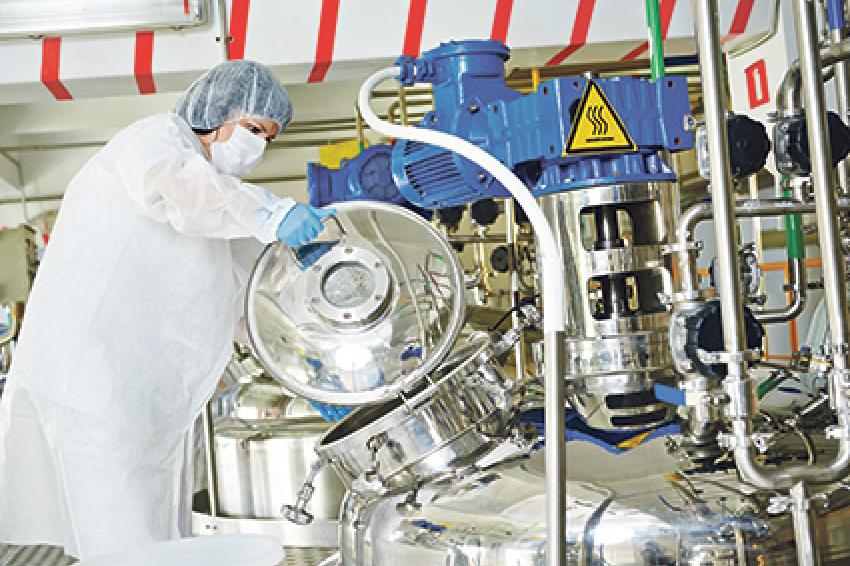Where Cleanliness Becomes a Challenge
From Outsourcing to Industry 4.0: ISPE Discusses the Future of Pharmaceutical Manufacturing
Requirements for pharmaceutical manufacturing are high. Rules for cleanliness are very strict. In addition, all processes have to be carefully documented and controlled. The International Society for Pharmaceutical Engineering is a not-for-profit organization with 20,000 members globally, connected by the themes of pharma manufacturing, technology, quality standards and regulation. Thorsten Schüller asked Dr Thomas Zimmer, vice president of European operations, for his views on the current challenges for the production of medical drugs.
CHEManager International: Only a few people have an idea about pharmaceutical manufacturing. Could you please outline some of the current challenges for the production of drugs?
Dr T. Zimmer: Let me start with the people working in such a factory. I consider it as essential that the function of engineers in pharmaceutical manufacture is seen as a strategic value for a company. For decades we have had a trend to outsource the classical work of engineers in the pharmaceutical industry. As a consequence many engineers do not consider the pharmaceutical industry as a good place to make a professional career. So they often choose other industries.
With this, external services for engineering often cannot be evaluated in-depth by in-house experts. This represents a risk for pharmacos in a highly regulated environment. For example, companies must give evidence that each manufacturing process exactly runs according to specifications and conditions as registered in a pharmaceutical product dossier. This requires a huge amount of work in documentation, which adds pressure on time and budgets and can slow down processes, waiting for closing of documentation first before continuation.
ISPE organizes the exchange of best practices in order to help the industry solve problems like this.
Each company develops its own approach in order to implement regulatory requirements?
Dr T. Zimmer: To a certain extent, yes. For example, some drugs have to be manufactured in a way that the final product is sterile. As some products cannot be sterilized at the end of the manufacturing process, they therefore have to be produced aseptically. Every step in the manufacturing process must be under sterile conditions. If, for example, the air in a production site is not exchanged regularly, there might be a risk for microbial contamination. If this process is not covered by excellent environmental monitoring, the contamination will probably be detected in a later stage, which might be too late.
The implementation of an aseptic process is difficult as there are many factors affecting the result, such as layout, machine design, people’s behavior, etc. And there is often room for interpretation of regulation, how to do it the best way. At ISPE there is a platform where subject matter experts meet in order to exchange their experience and expertise.
Did regulatory requirements become stricter in the past years?
Dr T. Zimmer: Absolutely. They are in a continuous development process and have become more demanding. Also the enforcement has become stricter. Health authorities also penalize based on findings within inspections.
What are the consequences for companies of stricter inspections?
Dr T. Zimmer: The expenditure for training and documentation increases, also the costs. Most pharmacos already have pressure on cost and budgets as margins go down and R&D costs go up.
How do pharma manufacturers react in order to cope with these challenges?
Dr T. Zimmer: For example, companies more and more check the feasibility to use so-called single-use technologies in order to reduce the costs for cleaning and cleaning validation. Single-use technologies can be parts of machines and reactors but also auxiliary equipment.
Do increased regulations make drugs safer?
Dr T. Zimmer: It is the overall goal to make drugs safer. All stakeholders strive for it permanently and with high energy. ISPE is in a continuous dialogue with regulators regarding best ways for implementation of new regulatory and GMP requirements. ISPE as a membership organization is considered “neutral,” and therefore ISPE is a well-accepted discussion partner by regulatory authorities. The benefit of this dialogue materializes often in an efficient and effective implementation of new requirements. With regard to this your question can be answered by a clear “yes.”
ISPE also addresses the theme “factories of the future.” What will they look like?
Dr T. Zimmer: This depends on the products to be manufactured. A factory for three big-volume products will look different than one for 30 small products. There is a tendency away from big-volume products to small-volume products in general. We will see more modular concepts allowing a shorter change over time and a higher agility of a factory. This is of special importance for biopharmaceutical products and underlines the need for excellent engineering.
At the annual conference of ISPE in Frankfurt at the beginning of May you talked also about the “new paradigm” in quality. What does this mean?
Dr T. Zimmer: In former times, there were only quality controls at the end of the manufacturing processes. Today there is the new standard that there is evidence and 100% transparency over all steps in all processes. This leads to another challenge — how to evaluate big data volumes and how to create transparency in the complexity of information?
Can you learn from other industries in terms of production, costs and compliance?
Dr T. Zimmer: Benchmarking is an important topic for pharmaceutical operations.
We will have a benchmarking presentation by Porsche Consulting regarding the question of how to manage complexity in the process industry. The automotive industry delivers products where no one is completely equal to the other. In the pharmaceutical industry there is also a high complexity given by global supply chains and many countries of destination. All of them require different package print versions, languages, pack sizes, labels, leaflets, etc., coming out of one or even several bulk products for the same marketed product. As Porsche Consulting found its way to manage complexity, we think that we can learn from them.
Contact
ISPE D/A/CH e.V.
Europastrasse 18
8152 Glattbrugg/Zürich
Switzerland






